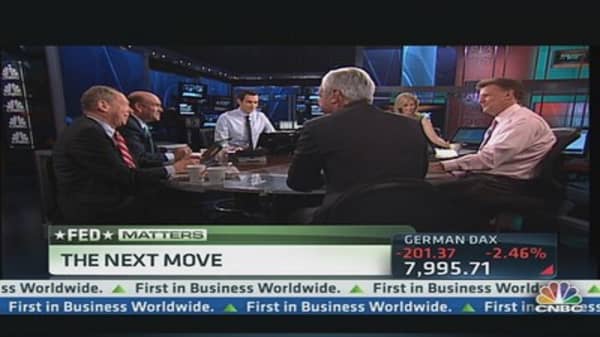Of course, you can always go with company specific issues, highlighting how Oracle has lagged behind the move from servers on-site to cloud computing. Still, the company vigorously disputes, that and says they are successfully making the transition.
By the way, lots of crowing at the NYSE over its big win on Oracle — shares will begin trading on the NYSE in July. Oracle was a long-time Nasdaq listing and this is a big win for the Big Board.
Oracle will be the largest market transfer EVER among all exchanges, at $156.4 billion.
Elsewhere:
1) St. Louis Fed President James Bullard to Federal Reserve Chair Ben Bernanke Bernanke: my press release is better than your press release. You know you're in a new era when Bullard, one of two dissenters to Wednesday's FOMC decision, issued his own press release to chastise Bernanke on the timing —and the logic—of Bernanke's announcement.
Here's the relevant paragraph:
"President Bullard also felt that the Committee's decision to authorize the Chairman to lay out a more elaborate plan for reducing the pace of asset purchases was inappropriately timed. The Committee was, through the Summary of Economic Projections process, marking down its assessment of both real GDP growth and inflation for 2013, and yet simultaneously announcing that less accommodative policy may be in store. President Bullard felt that a more prudent approach would be to wait for more tangible signs that the economy was strengthening and that inflation was on a path to return toward target before making such an announcement."
In other words, Bullard told Bernanke what he was doing (lowering growth expectations while simultaneously saying the Fed may taper bond purchases because the economy was doing better) didn't make any sense.
2) The quarterly share rebalancing of the S&P 500, S&P MidCap 400, S&P SmallCap 600 Indices will take place at the close today.
3) Some progress on a banking union in Europe. The ESM (Euriopean Stability Mechanism) will be able to make direct capital injections into banks — prior discussion had the ESM only being permitted to give money to sovereign countries, who could then loan money to banks if they chose to. This created a pernicious circle, where the problems were merely transferred to sovereign balance sheets.












